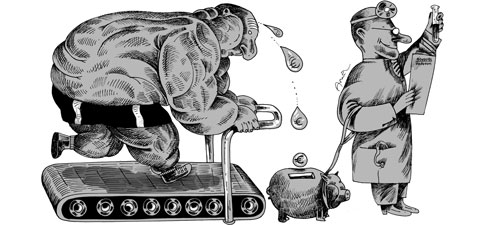Once again this year, Sigmar Gabriel joined with the unions in demanding an increase in taxes paid by the wealthy to ensure a fairer distribution of the burden of the crisis. For the social-democrat leader, the imposition of further demands on the rich is a matter of “social patriotism”. However, at the other end of the political spectrum the Christian-Democrats and the liberals were quick to step up to the plate to defend the better off, and to accuse Gabriel of wheeling out a well-worn socialist routine. As a result, debate on this issue has now assumed the wearisome air of an electoral squabble.
But we should not be beguiled by this impression. Over the years, the issue of growing disparities in wealth and incomes has evolved to the point where it is no longer a simple matter of equality. The reality is that these disparities are one of the main causes of the current crisis.
The increase in wealth that is concentrated in the hands of a small minority has meant that a considerable proportion of national income is now feeding a demand for financial products, and reducing the level of investment in goods and services.
Foolhardy investments
The well-off in Europe invest in bonds issued by banks, property companies and states, like Ireland, Portugal, Greece and Spain, which offer attractive rates of interest. In so doing, they have financed ill-judged investment on an enormous scale – the construction of housing and motorways that remain unused and other foolhardy infrastructure projects – that these countries would never have been able to undertake on their own.
As it stands, the sole purpose of the bridging loans provided by eurozone bailout funds is to aid states and their banks to remain solvent so that they can continue to pay their debts to misguided investors. As a result, we now have a situation in which it is not a matter of Germans, or the Dutch or the Finns etc, being obliged to bail out the Greeks, the Irish and the Spanish, but rather of middle class European taxpayers being forced to provide the funds required to save the fortunes of Europe’s wealthiest citizens.
Making the wealthy pay
In passing, we should note that Europe’s wealthy contribute very little to national budgets. The countries of the eurozone have created a monetary union, but instead of introducing a common fiscal policy, they have competed with each other in a bid to cut taxes and attract capital. As a result, taxes on income generated by capital are at a record low, while private fortunes throughout Europe have grown to the point where they have reached a level that is equivalent to two or even three times the sovereign debt of European states.
So we are now asking Europe’s wealthiest citizens to cover a larger share of the bill for bad investments. But this question is too important to be confined to the framework of national elections. We will also have to call for changes to the current bailout policy, which is ill-conceived.
As it stands, the EU debt collectors are urging crisis stricken countries to cut social services and increase taxes on the middle classes, while Greek shipping tycoons, Irish property barons and the Spanish super-rich pay hardly any income tax and invest their money in tax havens.
The priority for those who wish to save the euro should be to fight against such dysfunctions. If they do, the representatives of the unpopular European troika might still be perceived as heroes.
Taxation
The backlash against the rich has gone global
"It is never a great sign when politicians start appealing to taxpayers’ patriotism,” began Gideon Rachman in the Financial Times, following the announcement by French government minister Pierre Moscovici to raise the top rate of income tax to 75 per cent.
It is a mistake to portray the Hollande administration as Socialist dinosaurs. The truth is that the new French government is at the extreme end of a new global trend: an international backlash against the wealthy that is reshaping politics from Europe to the US to China. […]
US President Barack Obama has been making political capital ahead of the November election with his pledges to tax “millionaires and billionaires”, while branding his Republican rival Mitt Romney as representing of the tax-dodging elite. […] Eventually that kind of shift is liable to spark a political backlash. Western politicians, from Barack Obama to François Hollande are seeking to capture and channel this new mood... If this new mood hardens, it could mark the end of an era of lower taxes, deregulation and rising inequality that began in the late 1970s, with the rise of Margaret Thatcher and Ronald Reagan in the west and of Deng Xiaoping in China...
Was this article useful? If so we are delighted!
It is freely available because we believe that the right to free and independent information is essential for democracy. But this right is not guaranteed forever, and independence comes at a cost. We need your support in order to continue publishing independent, multilingual news for all Europeans.
Discover our subscription offers and their exclusive benefits and become a member of our community now!












